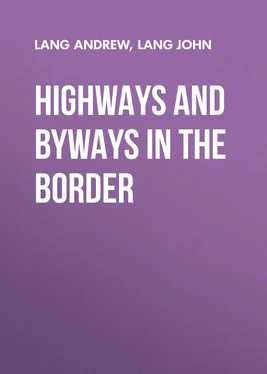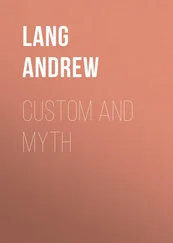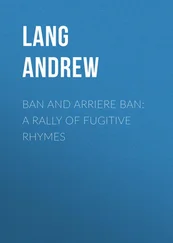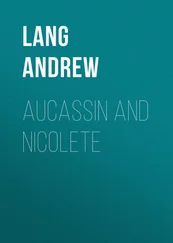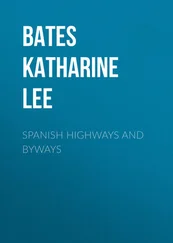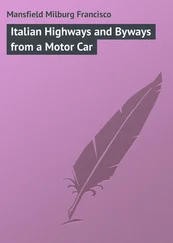Andrew Lang - Highways and Byways in the Border
Здесь есть возможность читать онлайн «Andrew Lang - Highways and Byways in the Border» — ознакомительный отрывок электронной книги совершенно бесплатно, а после прочтения отрывка купить полную версию. В некоторых случаях можно слушать аудио, скачать через торрент в формате fb2 и присутствует краткое содержание. Жанр: foreign_antique, foreign_prose, на английском языке. Описание произведения, (предисловие) а так же отзывы посетителей доступны на портале библиотеки ЛибКат.
- Название:Highways and Byways in the Border
- Автор:
- Жанр:
- Год:неизвестен
- ISBN:нет данных
- Рейтинг книги:4 / 5. Голосов: 1
-
Избранное:Добавить в избранное
- Отзывы:
-
Ваша оценка:
- 80
- 1
- 2
- 3
- 4
- 5
Highways and Byways in the Border: краткое содержание, описание и аннотация
Предлагаем к чтению аннотацию, описание, краткое содержание или предисловие (зависит от того, что написал сам автор книги «Highways and Byways in the Border»). Если вы не нашли необходимую информацию о книге — напишите в комментариях, мы постараемся отыскать её.
Highways and Byways in the Border — читать онлайн ознакомительный отрывок
Ниже представлен текст книги, разбитый по страницам. Система сохранения места последней прочитанной страницы, позволяет с удобством читать онлайн бесплатно книгу «Highways and Byways in the Border», без необходимости каждый раз заново искать на чём Вы остановились. Поставьте закладку, и сможете в любой момент перейти на страницу, на которой закончили чтение.
Интервал:
Закладка:
In these degenerate days, the Fair lasts but one day in place of eight, and Feuds, new or old, are unknown. But not so very long ago the rivalry at this Fair of the neighbouring towns of Kelso and Jedburgh was very bitter. Roxburgh had ceased to be, indeed, but the Fair survived, and it chanced that the Provost and Bailies of Jedburgh – like Roxburgh, a Royal burgh, – having under some old charter acquired a right to "proclaim" the Fair and collect the market dues, duly came in state each August in order to exercise this privilege at the ancient stance. Now, Kelso in the course of time became a larger and more important town than Jedburgh; it is, moreover, in close proximity to the ground on which the Fair is held, whereas Jedburgh was no better than a foreign land, miles removed – ten, at least, – from Roxburgh. Hence Kelso resented what it considered to be an outrage on the part of her officious neighbour. What was Jedburgh that she should oust them from those market tolls and dues! A beggarly interloper, no less! The outcome of such a frame of mind was generally what might be expected amongst men whose forebears for many hundreds of years had been fierce fighters. As the procession of Jedburgh magistrates, all in their robes and escorted by a compact body of townsmen, advanced towards the place of proclamation, taunts of "Pride and Poverty!" – "Pride and Poverty!" were hurled at their ears by the irritated men of Kelso. "Doo Tairts an' Herrin' Pies!" fiercely retorted Jedburgh's inhabitants. It is difficult now-a-days to see where came in the sting of the original taunt, or the appositeness of the "Countercheck Quarrelsome." But in those old days they were amply sufficient. Some man, more hasty, or less sober, than his neighbour would follow up the taunt by a push or a blow, and St. James's Fair was speedily as lively a spot as now could be any Fair even in Ireland. Kelso and Jedburgh were "busy at each other"; and sometimes one prevailed, sometimes the other. An attempt that Kelso once made to hold the Fair on its own side of the river was utterly defeated; Jedburgh marched across the bridge and made things so warm that the experiment of shifting the venue of St. James's Fair has never been repeated.
No doubt, when Roxburgh ceased to be a Royal Burgh, its rights naturally devolved on Jedburgh, the only other Royal Burgh in the country. But Jedburgh tradition tells of a time when the English, taking advantage of heavy floods which prevented Kelso men from crossing the river, raided the Fair and carried off rich plunder. Then Jedburgh, coming to the rescue, smote the English and recaptured the booty, and for their gallant conduct were awarded those privileges which they still exercise.
The Kelso taunt of "Pride and Poverty" may possibly have originated from a custom to which the economical burgesses of Jedburgh seem to have been addicted. In a letter written in 1790, Sir Walter Scott mentions that when he himself visited the Fair in that year, he found that, there not being in possession of the men of Jedburgh enough riding boots to accommodate all the riders in the procession, the magistrates had ruled that only the outside men of each rank should wear boots, or, rather each a boot on his outer leg. Thus, as the men rode in threes, one pair of boots would be sufficient to maintain the dignity of each rank, – a device worthy of Caleb Balderstone himself. It is easy enough to assign an origin to "Pride and Poverty," but the local custom which gave occasion for the bitter taunt of "Doo tairts and Herrin' Pies" is baffling. There are many such taunts in the Border, hurled by town at rival town. "Selkirk craws," is the reproach flung at that burgh by its neighbour, Galashiels; and
"Galashiels Herons, lockit in a box,
Daurna show their faces, for Selkirk gamecocks,"
is, or was, the jibe that stung Gala lads to fury.
Before quitting the subject of Roxburgh, it may be of interest to mention that in the churchyard of the present village of that name there is a gravestone to the memory of the original of Edie Ochiltree, the bluegown of Sir Walter's Antiquary . Andrew Gemmels was his name. He died in 1793 at Roxburgh Newtown, a farm on the banks of Tweed a few mi es from Roxburgh, at the great age of one hundred and six.
The first tributary received by Teviot on the right bank is the Kale Water, running through the parish of Linton, which was in King David's time an appanage of Kelso Abbey. The church has been restored, but the walls are, like those of Kelso, Norman work, and in the porch is an enigmatic piece of sculptors' work; apparently somebody is fighting a dragon – Sir Herbert Maxwell suggests St. George, but St. Michael was the more orthodox dragon slayer. About the object grew an aetiological myth; a Somerville of old times
"Slew the Worm of Worrnes glen
And wan all Lintoun parochine."
The dragon-slaying story is found in most parts of the world, from Troy to Dairy in the Glenkens. Here the Worm twisted himself round the Mote, or tumulus (apparently the basis of an old fort), and was killed by the local blacksmith. In 1522-1533, Linton tower was among the scores of such Border Keeps which the English destroyed. They could hold their own against a Border raid; not in face of a regular English army. Roxburghshire was not so deeply tainted by Covenanting principles as Galloway, Lanarkshire, and the south-west, Ayrshire and Renfrewshire. Covenanters needed wild hills and wild wastes. They are said to have held coil venticles in a deep glen of Kale; but, as a rule, they knew enough to preach in places of wide outlook, where they could detect the approach of parties of dragoons. In the bed of a burn they would be at great disadvantage.
A tower more interesting than that of Linton, namely Ormistoun, fell when Linton fell; but it must have been rebuilt, for here, in Mary Stuart's day, dwelt the Black Laird of Ormistoun, James, with Hob, his brother, two of Bothwell's most cruel and desperate "Lambs." The Black Laird was with Bothwell, Hay of Talla (on upper Tweed), and one of Bothwell's own clan, Hepburn of Bowton, when they placed the powder under Darnley's chamber in Kirk o'-Field (February 9-10, 1567), and so, in the feeling words of Bothwell, "sent him fleeing through the air." After doing another deed as treacherous as this murder, the Black Laird was taken, tried, and hanged in 1573. Bothwell was Warden of the Border, which he ruled from Hermitage Castle on the Liddel water, and all these loose Border lairds rode and slew at his bidding. They had probably, in that twilight of faith, no religion in particular; Catholicism lingered in the shape of oaths, Calvinism was not yet well settled in these regions. But, probably in prison, the Black Laird "got religion." He professed to be of the Elect, and confident of his salvation, while he drew a dark enough picture of life among lairds of his quality. On the day of his hanging he said, "With God I hope this night to sup… Of all men on the earth I have been one of the proudest and most high-minded, and most filthy of my body. But specially, I have shed innocent blood of one Michael Hunter with my own hands. Alas, therefore, because the said Michael, having me lying on my back, having a pitchfork in his hand, might have slain me if he pleased, but did it not, which of all things grieves me most in conscience. Within these seven years I never saw two good men, nor one good deed, but all kinds of wickedness."
This wretch, once on his feet, must have butchered some poor hind who had spared him. In reading Pitcairn's Criminal Trials , and the Register of Privy Council for the period of the Reformation, we find private war, murder, and rapine to have been almost weekly occurrences, from the Upper Tweed to the Esk. The new Gospel Light made the darkness visible, and we see robberies and vendettas among the dwellers in the peel towers, of which the empty shells stand beside every burn in the pleasant lands then clouded with smoke from blazing barn and tower and cottage. The later Ormistouns had "particularly deadly feud" with the Kers of Cessford; the Kers annexed their lands, and the last Ormistoun was a public hangman; the ancestral Orm was a flourishing and pious gentleman of the twelfth century, a benefactor of the early monks of Melrose. Meanwhile, the castle of Cessford, the ancestral hold of that line, is not far from a place called Morbattle in the Black Laird's day, and now, more pleasantly, Morebattle. The name has no connection either with festivity or feud, and "More" is not the Celtic mor , "great." "More" is "mere," a lake, and "botl" is Anglo-Saxon, "a dwelling." Cessford Castle had the name to be only second to Bothwell's castle of Dunbar, and Logan of Restalrig's eyrie on a jutting rock above the sea, Fastcastle. In the great English raid of 1523, "Dand Ker," Sir Andrew, the head of the clan, rather feebly surrendered the place, which was secure in walls fourteen feet thick.
Читать дальшеИнтервал:
Закладка:
Похожие книги на «Highways and Byways in the Border»
Представляем Вашему вниманию похожие книги на «Highways and Byways in the Border» списком для выбора. Мы отобрали схожую по названию и смыслу литературу в надежде предоставить читателям больше вариантов отыскать новые, интересные, ещё непрочитанные произведения.
Обсуждение, отзывы о книге «Highways and Byways in the Border» и просто собственные мнения читателей. Оставьте ваши комментарии, напишите, что Вы думаете о произведении, его смысле или главных героях. Укажите что конкретно понравилось, а что нет, и почему Вы так считаете.
